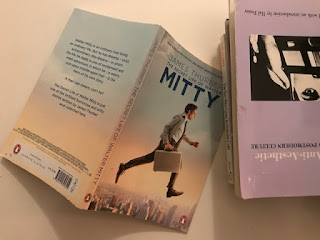I'm not sure what moved me to pick up a copy of James Thurber stories during my last bout of thrifting. It certainly wasn't the 2013 movie tie-in cover, with the annoying-when-miscast Ben Stiller playing the subject of Thurber's "The Secret Life of Walter Mitty" (1939). For me, Walter Mitty will always be Danny Kaye, who shined in the 1947 version.
Between the publication of Thurber's "The Secret Life of Walter Mitty" and its first film adaptation came "The Secret Life of James Thurber" (1943), in which the author discusses a just-published Salvador Dali book ("paintings by Salvador Dali and photographs of Salvador Dali") relative to his own recent publication. Dali's book is priced at six dollars, Thurber's at $1.75 -- a difference that bothers Thurber enough to intrigue the reader, draw us into a story not of how different the two are from each other, as Thurber initially implies, but how similar.
Stuck as Thurber is in this injustice, he has "one escape": "my secret world of idiom." At this point the laughs come at both the expense and the appreciation of art, proving once more that in Childe America you can have it both ways. But as is often the case, to achieve this the humorist reverts to a younger, more innocent time: the "surrealist landscapes of my youth," when turns of phrase -- "the old lady who was always up in the air, the husband who did not seem to be able to put his foot down," etc. -- are pictured literally.


































